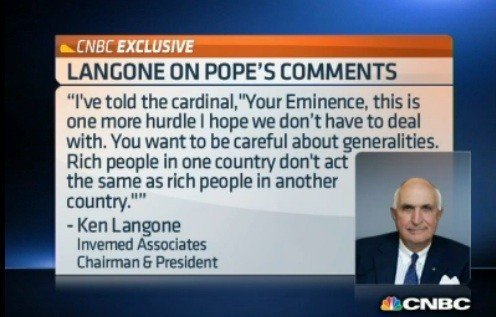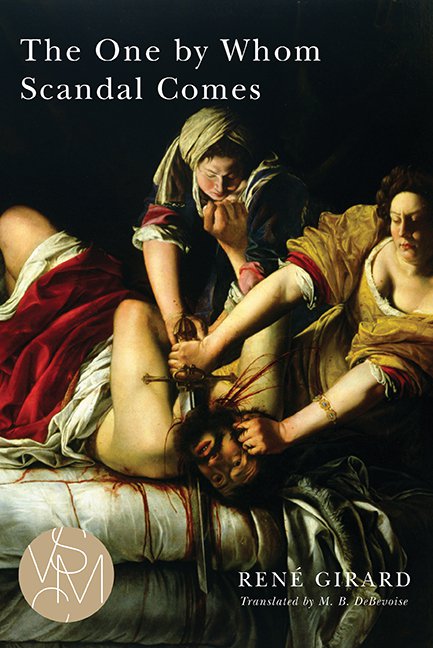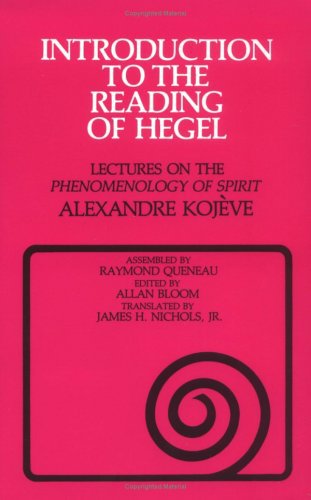
Pope Francis has an uncanny ability to make the Gospel scandalous. There isn’t enough space here to enumerate all the groups he’s managed to tick off.
The most amusingly cretinous reaction to Evangelii Gaudium came from one of our most dangerous illegal alien groups: the ridiculously rich.

Kenneth Langone, a man rich enough to make a play at buying the NYSE, was recently quoted as saying he’s having second thoughts about continuing to fund the restoration of St. Pat’s in New York because of the pope’s strident criticism of the rich.
Cardinal Dolan’s attempt to save face only made things worse. He gave the following saccharine explanation to the rich guy:
“The pope loves poor people. He also loves rich people. He loves people, alright? He’s not into the condemning game.”

Can you imagine the mentality the person who accepts and requires such a dumbed-down explanation? Why not risk telling Langone the truth and losing his money? How much ass can the American Church kiss before it soils itself irreparably?
That’s one hell of a defanging of the Bible and Tradition. I know my Catholic audience probably doesn’t read the Bible much, but perhaps you vaguely remember New Testament passages such as this one?
“Come now, you rich, weep and howl for your miseries which are coming upon you. Your riches have rotted and your garments have become moth-eaten. Your gold and your silver have rusted; and their rust will be a witness against you and will consume your flesh like fire. It is in the last days that you have stored up your treasure! Behold, the pay of the laborers who mowed your fields, and which has been withheld by you, cries out against you; and the outcry of those who did the harvesting has reached the ears of the Lord of Sabaoth.”
On the other hand, Langone’s Gospel is probably more in line with Kojeve’s famous “Last Man” footnote in the Introduction to the Reading of Hegel: Lectures on the Phenomenology of Spirit:
“If Man becomes an animal again, his arts, his loves, and his play must also become purely ‘natural’ again. Hence it would have to be admitted that after the end of History, men would construct their edifices and works of art as birds build their nests and spiders spin their webs, would perform musical concerts after the fashion of frogs and cicadas, would play like young animals, and would indulge in love like adult beasts… What would disappear, then, is not only Philosophy or the search for discursive Wisdom, but also that Wisdom itself. For in these post-historical animals, there would no longer be any ‘[discursive] understanding of the World and of self’. [See: my Walker Percy post on the distinction between animality/environment and self/world here]”

“At the period when I wrote the above note (1946), Man’s return to animality did not appear unthinkable to me as a prospect for the future (more or less near). But shortly afterwards (1948) I understood that the Hegelian Marxist end of History was not yet to come, but was already … here and now… I was led to conclude from this that the ‘American way of life’ was the type of life specific to the post-historical period, the actual presence of the United States in the World prefiguring the ‘eternal present’ future of all of humanity. Thus, Man’s return to animality appeared no longer as a possibility that was yet to come, but as a certainty that was already present.”
If America has indeed reached the end of history, then (if you will permit me to give a Percy Lost in the Cosmos gloss to this) there is no condemning the natural cycles of consumption and Langone is right.
There is also nothing to satisfy our triadic need for a world. Perhaps the world shall be altogether abolished? Although I somehow doubt that this would be a victory over the Prince of this World.
UPDATE: It turns out Cardinal Dolan was quoting Pope Francis. Here it is in context. The omission of the passage with bite is telling: “The Pope loves everyone, rich and poor alike, but he is obliged in the name of Christ to remind all that the rich must help, respect, and promote the poor. I exhort you to a generous solidarity and to the return of economics and finance to an ethical approach which favors human beings.”
These guys might have sold out somewhere along the way, but this song still packs the right sort of punch:
http://www.youtube.com/watch?v=MptfsoNWIVE











